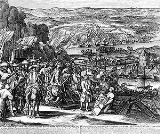
Russo-Turkish War, 1686-1700
Encyclopedia
The Russo–Turkish War of 1686–1700 was part of the joint European effort to confront the Ottoman Empire
. The larger European conflict was known as the Great Turkish War
.
The Russo–Turkish War began after the Tsardom of Russia
joined the European anti-Turkish coalition
(Habsburg Austria, Poland–Lithuania, Venice
) in 1686. During the war, the Russian army organized the Crimean campaigns
of 1687 and 1689 and the Azov campaigns
of 1695 and 1696.
In light of Russia's preparations for the war with the Swedish Empire
and other countries' signing the Treaty of Karlowitz
with the Ottoman Empire in 1699, the Russian government signed the Treaty of Constantinople
in 1700. The Treaty ended the war, ceded
Azov and the Taganrog
fortress to Russia, affirmed Russian pilgrimage
rights to the Holy Land, established a Russian diplomatic base in Constantinople, and secured the return of all prisoners of war. The Tsar also affirmed that his subordinates, the Cossacks, would not attack the Ottomans, while the Sultan affirmed his subordinates, the Crimean Tatars
, would not attack the Russians.
Ottoman Empire
The Ottoman EmpireIt was usually referred to as the "Ottoman Empire", the "Turkish Empire", the "Ottoman Caliphate" or more commonly "Turkey" by its contemporaries...
. The larger European conflict was known as the Great Turkish War
Great Turkish War
The Great Turkish War refers to a series of conflicts between the Ottoman Empire and contemporary European powers, then joined into a Holy League, during the second half of the 17th century.-1667–1683:...
.
The Russo–Turkish War began after the Tsardom of Russia
Tsardom of Russia
The Tsardom of Russia was the name of the centralized Russian state from Ivan IV's assumption of the title of Tsar in 1547 till Peter the Great's foundation of the Russian Empire in 1721.From 1550 to 1700, Russia grew 35,000 km2 a year...
joined the European anti-Turkish coalition
Coalition
A coalition is a pact or treaty among individuals or groups, during which they cooperate in joint action, each in their own self-interest, joining forces together for a common cause. This alliance may be temporary or a matter of convenience. A coalition thus differs from a more formal covenant...
(Habsburg Austria, Poland–Lithuania, Venice
Venice
Venice is a city in northern Italy which is renowned for the beauty of its setting, its architecture and its artworks. It is the capital of the Veneto region...
) in 1686. During the war, the Russian army organized the Crimean campaigns
Crimean campaigns
Crimean campaigns of 1687 and 1689 were two military campaigns of the Russian army against the Crimean Khanate. They were a part of the Russo-Turkish War and Russo-Crimean Wars. These were the first Russian forces to come close to Crimea since 1569...
of 1687 and 1689 and the Azov campaigns
Azov campaigns
Azov campaigns of 1695–96 , two Russian military campaigns during the Russo-Turkish War of 1686–1700, led by Peter the Great and aimed at capturing the Turkish fortress of Azov , which had been blocking Russia's access to the Azov Sea and the Black Sea...
of 1695 and 1696.
In light of Russia's preparations for the war with the Swedish Empire
Swedish Empire
The Swedish Empire refers to the Kingdom of Sweden between 1561 and 1721 . During this time, Sweden was one of the great European powers. In Swedish, the period is called Stormaktstiden, literally meaning "the Great Power Era"...
and other countries' signing the Treaty of Karlowitz
Treaty of Karlowitz
The Treaty of Karlowitz was signed on 26 January 1699 in Sremski Karlovci , concluding the Austro-Ottoman War of 1683–1697 in which the Ottoman side had been defeated at the Battle of Zenta...
with the Ottoman Empire in 1699, the Russian government signed the Treaty of Constantinople
Treaty of Constantinople (1700)
The Treaty of Constantinople or Istanbul was signed on 13 July 1700 between the Tsardom of Russia and the Ottoman Empire. It ended the Russo-Turkish War of 1686-1700. Russian tsar Peter the Great secured possession of the Azov region and freed his forces to participate in the Great Northern War...
in 1700. The Treaty ended the war, ceded
Cession
The act of Cession, or to cede, is the assignment of property to another entity. In international law it commonly refers to land transferred by treaty...
Azov and the Taganrog
History of Taganrog
- Ancient history:The excavations conducted by the German Archaeological Institute led by Ortwin Dally and Don Archaeological Society, brought to conclusion that there was a Greek settlement in the place of the modern-day Taganrog, founded in the late 7th century BC.It played an important role in...
fortress to Russia, affirmed Russian pilgrimage
Christian pilgrimage
Christian pilgrimage was first made to sites connected with the ministry of Jesus. Surviving descriptions of Christian pilgrimages to the Holy Land and Jerusalem date from the 4th century, when pilgrimage was encouraged by church fathers like Saint Jerome and established by Helena, the mother of...
rights to the Holy Land, established a Russian diplomatic base in Constantinople, and secured the return of all prisoners of war. The Tsar also affirmed that his subordinates, the Cossacks, would not attack the Ottomans, while the Sultan affirmed his subordinates, the Crimean Tatars
Crimean Tatars
Crimean Tatars or Crimeans are a Turkic ethnic group that originally resided in Crimea. They speak the Crimean Tatar language...
, would not attack the Russians.

